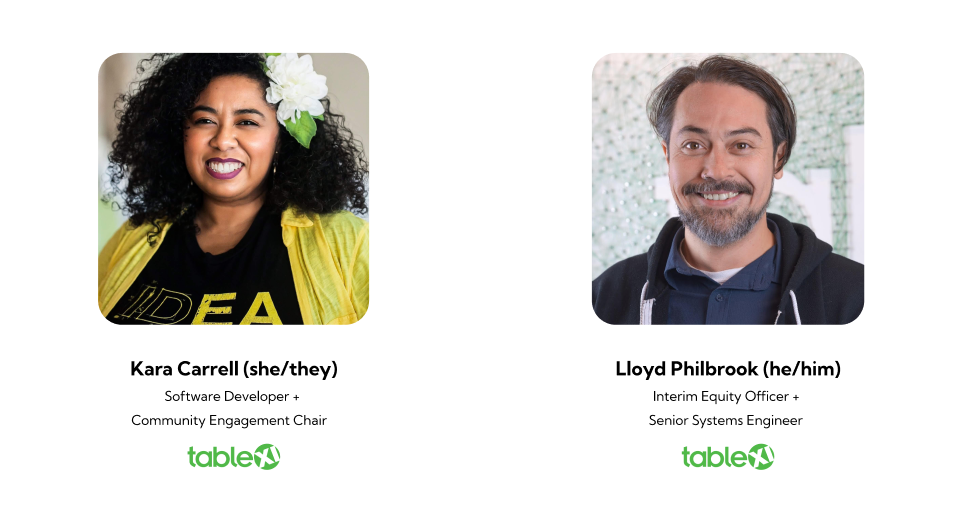Accountability is a Leading Indicator for Successful DEI
In honor of February’s Black History Month, we interviewed one of our company partners, Table XI, to amplify how they have stepped up to make a long-term, dedicated impact towards diversity, equity, and inclusion (DEI) for their employees and community.

The interview was with Kara Carrell (she/they), Software Developer and Community Engagement Chair, and Lloyd Philbrook (he/him), Interim Equity Officer and Senior Systems Engineer.
Carrell and Philbrook highlighted how monumentally important it is for organizations of any size to proactively build systems and processes of accountability that positively impact, especially with diversity, equity, and inclusion (DEI) efforts. Stakeholders, partners, investors, employees, and consumers hold companies accountable to make a positive impact on social issues and causes. And Table XI is taking steps to ensure they are building a diverse, equitable, and inclusive culture by actively seeking systems to help employees feel safe and comfortable in their workplace.
The importance of these inclusive systems is what we will cover here to help your company create proactive accountability around DEI.
The importance of proactive accountability
Proactive accountability creates work environments where employees feel safe to bring their full selves to work.
During our conversation with the Table XI team, proactive accountability came up several times.
The first of which was a discussion about accountability and vulnerability. Carrell said:
When companies are launching a workplace giving platform like Percent Pledge, they’re asking people to share the causes they care about most. That includes exposing that I am very dedicated to work that supports the Black and Brown Trans community. That connection is now being made visible. And I have to be OK with any conversations that visibility may prompt. So there are levels of feeling safe and comfortable with your colleagues. Fortunately, Table XI has created a culture of accountability which allows me to bring my full self to work.
Because Table XI was proactive in creating a safe and accountable workplace environment, Carrell felt safe to bring her full self to work. Also, Carrell’s quote highlights the importance of workplace philanthropy programs because the causes someone cares about are a huge part of their identity – a huge part of their “full self.”
Question for readers: Has your company established the kind of culture where every employee feels safe and comfortable to bring their full self to work?
Proactive accountability unlocks higher levels of organizational growth.
In addition to making employees feel empowered to bring their full selves to work, practicing proactive accountability also unlocks higher levels of organizational growth.
Carrell explained this critical point in connection to Table XI’s DEI efforts:
I would recommend the companies be very aware that this will move them into space where their colleagues are going to have a more vulnerable relationship, and conversations, which I think does put you in a much better position and place to be doing the harder work of engaging with DEI work. That’s where the feeling of belonging and being able to empathize with someone to support them in their concerted efforts to make the world a better place.
Carrell added that our Pledge Reports sparked some of these critical DEI-related conversations because they include impact stories from the vast array of nonprofits that the Table XI team is actively supporting:
That’s where it often starts – is being able to share the stories about wanting to see the mission of these organizations move forward. And then opening the conversation of why is that and opens colleagues up to each other and their stories.
Proactive accountability enables better, faster, more thoughtful outcomes.
The third time proactive accountability came up was about the matching donation campaign Table XI launched to help its team support Percent Pledge’s Racial Equity Cause Portfolio.*
Table XI was one of our first customers to launch a matching donation campaign focused solely on Racial Equity. And the team was able to launch this matching donation campaign thoughtfully and rapidly because it had already done the work; accountability was already built-in.
As they explained, Percent Pledge’s role was to power their action and make it more strategic and impactful. Philbrook said:
There was a sense already in our organization that folks wanted to find a way (right out of the gate) to participate, be heard, and be a part of the conversation. And so it translated very easily, especially with the ease of use of Percent Pledge. In addition to that, the ease in which of adding partners and finding organizations to partner with within the space was critical. And being able to say ‘hey, we would like to donate to a particular organization’ and the openness and willingness of Percent Pledge to vet the organizations and add them to the list was great.
*Percent Pledge’s Racial Equity Cause Portfolio comprises these top-rated 501c3 charities: The Bail Project, Equal Justice Initiative, LIVEFREE, and National CARES Mentoring.
The parallel between the business and social imperatives to act now to help create sustainable racial equity
The importance of proactive accountability should by now be clear, but we also want to make clear the path forward includes significant hurdles when it comes to this work.
For businesses to be on a similar path as Table XI is now – towards a beautiful place where every member of their team feels safe and comfortable and empowered and hopeful and heard – leaders must proactively engage employees in creating systems that may decrease the leader’s relative power.
That is hard to do but well worth it to create a more inclusive, sustainable, and agile workplace. Also, if that carrot is not enough, then think about the alternative—the stick. Many businesses now face the situation where employees are demanding accountability and still skeptical of its authenticity even if it is achieved.
Lastly, and quite interestingly, our conversation with Table XI illuminated how the significant hurdle for businesses (described above) reflects the broader challenge our larger society faces. The murder of George Floyd and the Black Lives Matter movement’s reemergence has exposed that white supremacy culture is still pervasive throughout America.
Thanks to the Black Lives Matter movement, merely being not racist is not enough. Creating sustainable equity and change will require America’s leaders and white majority groups to proactively work alongside communities of color in creating systems that uplift and equalize power. That is hard to do, but we all share this world, and doing that hard work will create a more inclusive, sustainable, and equitable world for everyone.



%20(1).png)